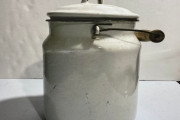At the bottom of my aunt’s shoebox lie three sepia-aged photographs. They show an elderly, white-haired man leaning against a large black Vauxhall Victor car. They are unremarkable.
For me, memoirs writ large are memories of times lived, movie-like, rich with images, smells, and actions. Memoirs writ small are picture postcards, signposts to what came before and what followed. Woven through both are the emotions, the feelings of warmth and cold. Their vividness is not chained to the immediacy of the memory – be it a movie or be it a four by six piece of card. Just as the intensity is unchained so is the time. The ones that fleetingly flame in the movie and those, hidden in the post card, that wash over your body bringing the warmth or the cold – you with no control over how long they linger. Memoirs – actions and feelings, movies and postcards.
There aren’t many move-like memories of the man, John Morris, my dad’s dad. Tall for the times, a long-lived 80-years old. A big man, too. The snapshots don’t tell much about him. Unremarkable photos, yes, but conjuring sights of the man that live anew. Conjuring feelings of the most loved presence of my childhood – Grandad Morris.
His house is a cricket pitch away from the London express train line on the other side of a tall wall. The house is three small down and three smaller up – if you could call the third bedroom a bedroom. Big enough and comfortable enough for a small boy. One of hundreds of houses built for miners and railway men. Grandad’s house stood out, white walls and butternut trim.
Grandad John had been an express train engineer, speeding the overnight Great Western Railways mail train from Paddington to Fishguard for the ferry to Rosslare and Dublin. Thundering by, shaking the windows, part of the nights I spent in this house.
He had been paid £4 a week. A comfortable sum. An adequate pension. The gold watch on a chain tucked into his waistcoat pocket. Brought out frequently to check the time on the pendulum clock just visible in the hallway.
He always wears a black three-piece suit without the studded collar. A symbol of status, that suit. There is his chair. Suffused with the aromas of old leather and sweat that I smell even now. The paraphernalia for his pipe perched on an oversize stand. His pipe is more often unlit than lit. The chair is strangely parallel to the fire, only facing it in the dead of winter. He beckons me up and I climb excitedly into the cloud of smells, primed to listen to his tales, starting always with ‘Now look here, Davey’. A rich Welsh voice. Him like a rock, me like a sailor washed to shore.
He visits every weekend, respite from his carer, my Auntie Molly, the martinet. He watches rugby – the passion of Wales – on the fuzzy black and white television, amazed at the machine. I stand at his shoulder. I don’t understand the game at all. Soaking in his smells is enough. Connected. Safe.
I have him for just two years. Then we move away from Neath and rarely visit.
It is the new house. Now. The two years coming to an end. The room is dark, brooding. Everything still. Only two table lamps lit. Dad has gone to be with Grandad. A neighbour, a nearby Neath friend of Grandad, sits with Mum. They are waiting. I am quiet – unknowingly waiting too. Mum says Grandad is poorly. Has he got the flu? When will we visit?
The phone rings. With my mother’s words, I understand that I won’t ever be with Grandad again. The emptiness come first. The tears follow.
Grandad does fade over the years. Hiding, perhaps.
Until the shoebox.
So little contact, so much connection.






Peter Scotchmer2 years ago
Brilliant evocation from David, as usual: deeply atmospheric, vividly recalled and felt, yet unmarred by sentimentality. First-rate!